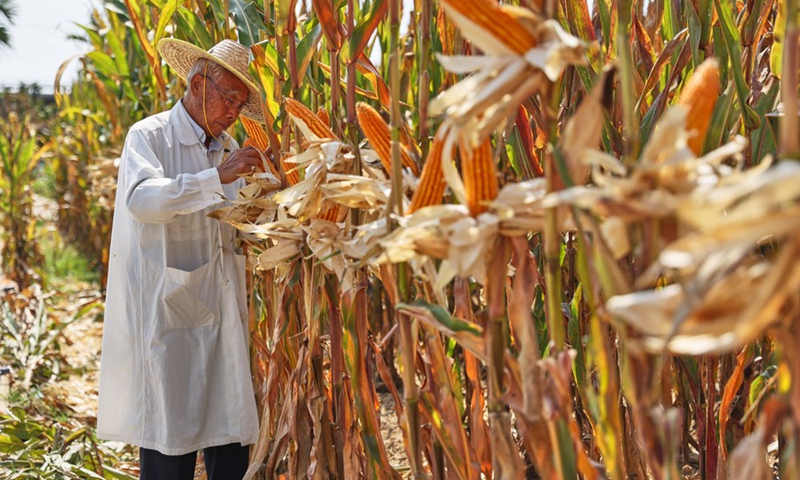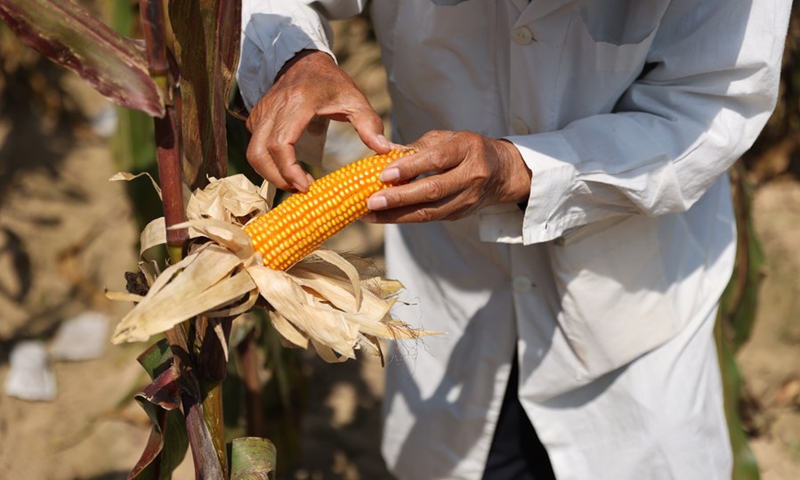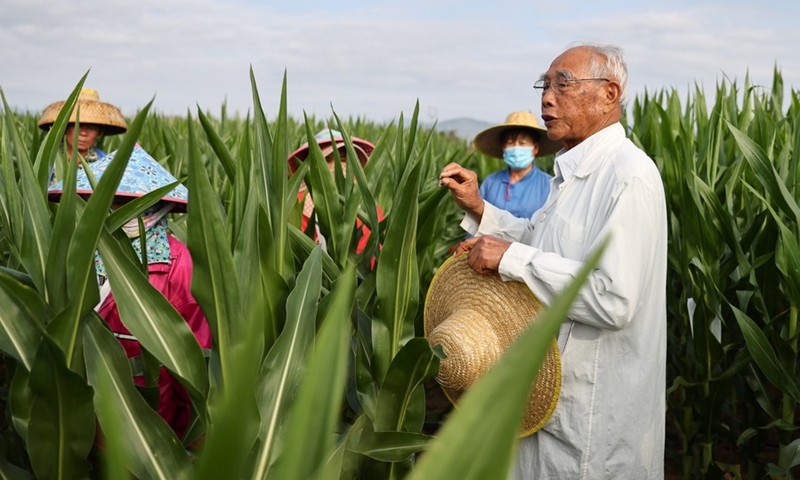
Cheng Xiangwen observes the growth of corns at the field of a cultivating base in Sanya, south China's Hainan Province, Feb. 24, 2021. (Photo: Xinhua)

Cheng Xiangwen observes the growth of corns at the field of a cultivating base in Sanya, south China's Hainan Province, Feb. 24, 2021. (Photo: Xinhua)

Cheng Xiangwen (1st R) instructs as the workers learn the pollination methods at the cornfield of a cultivating base in Sanya, south China's Hainan Province, Feb. 24, 2021.(Photo: Xinhua)
For his 86th birthday, Cheng Xiangwen enjoyed a corn-shaped cake his colleagues prepared for him.
"My birthday wish is to develop better corn varieties," he said. After the celebration, he embarked on yet another journey to Sanya, in south China's Hainan Province, where he worked for a big chunk of his life.
Cheng, 86, is an agronomist and spends most of his life studying and cultivating corn. He comes to Sanya in November every year and stays for six months for corn breeding.
Cheng's work forms part of China's efforts to strengthen agriculture and food security.
Over the years, China's policies on ensuring food security have played a significant role in elevating the living standards of its 1.4 billion people and contributed to world food security. Ensuring food security will remain a priority in the country's agricultural development in 2022.
During the annual central rural work conference held last month, Chinese leaders reiterated that the nation must secure its food supply at all times, urging all relevant parties to play their part in protecting farmland and stabilizing grain output.
"GOLD BEANS"
Cheng is a native of central China's Henan Province, a massive corn production base. After graduating in 1963, Cheng became an agrotechnician in Henan's Xunxian County. At that time, the county saw a meager average annual corn output of 750 kg per hectare.
Once, when he was conducting a field survey, a local farming lady said to him in tears: "You graduated from college. Could you please find a way to boost the corn output here? If the yields are higher, our children will no longer suffer from hunger."
Since then, Cheng has made breeding high-yield corn varieties his life goal.
In 1964, he came to Hainan, where it was warmer, and started breed work there. He slashed the cultivation period and created hybrid corn breeds for the first time. With these new breeds, farmers in Xunxian County saw their average corn output exceed 3,750 kg per hectare per year.
Local farmers described his seeds as "golden beans."
Despite the beautiful coastline, the environment where Cheng works used to be plagued by grinding poverty and poor traffic. A local slang once described the environment as having rampant rats, mosquitoes, leeches, and poisonous snakes.
At that time, he did everything on his own. He went back and forth between the cornfield and a public toilet several kilometers away to manure the field. He lived in a local villager's house for over 20 years. He frequently went to the deep mountains to chop firewood to cook during this time.
HARVESTING
His hard work has paid off. Now, authorities have approved 14 new, high-yield corn varieties Cheng helped develop.
Soon, Cheng will spend his 57th Chinese Lunar New Year at the cultivating base in Sanya. Now, he heads a research team of more than 10 members. The research facilities there are much better.
Cheng is dedicated to breeding high-yield corn varieties with stronger resistance that are easier to harvest with machines. He still goes to the fields each day and observes and records the corn plants.
"Cultivating seeds is like raising kids. Only by careful parenting can you become familiar with their strengths and weaknesses and help them grow healthy," he said.
